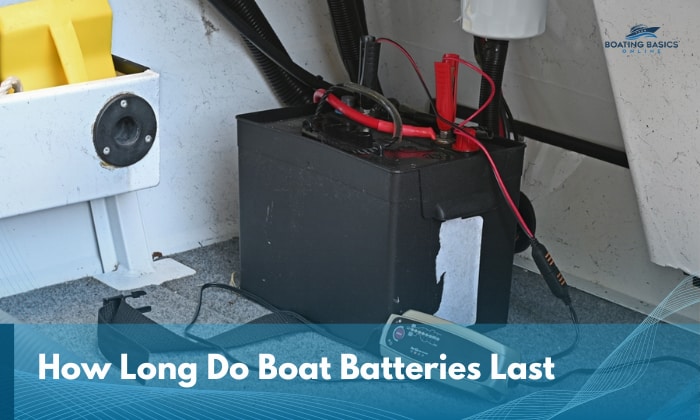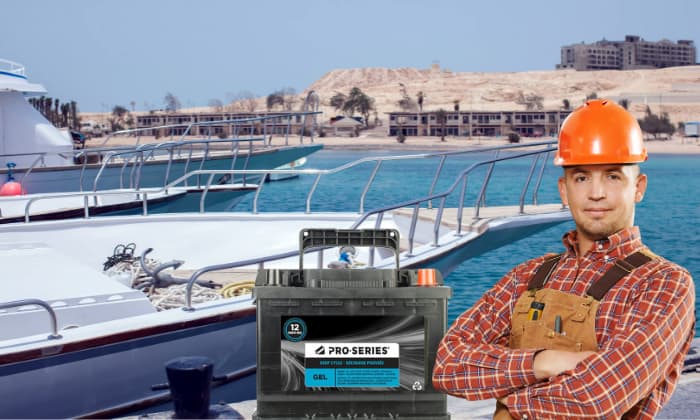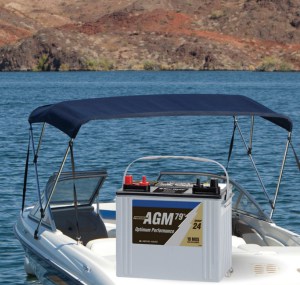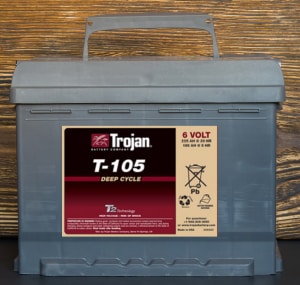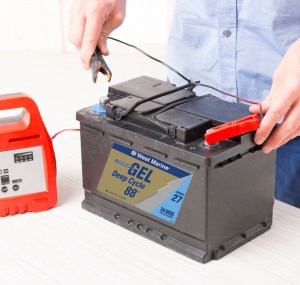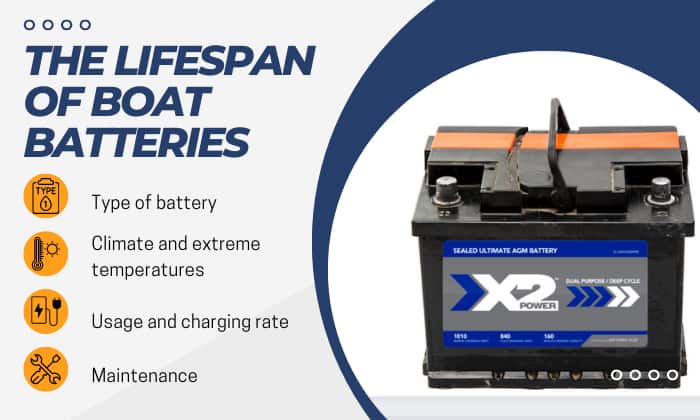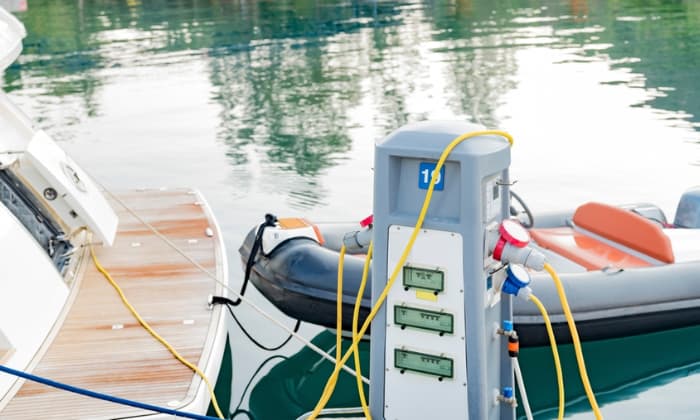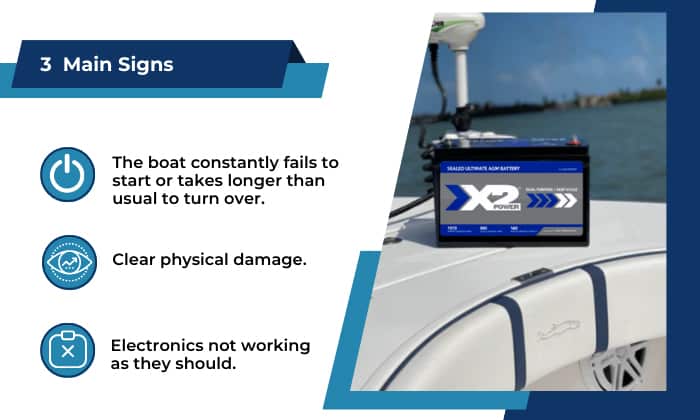Have you ever had a boat battery that has lasted for as long as you know? Or did you end up, rather inauspiciously, with one dying out way too soon? The thing is, marine battery lifespan depends on charge cycles, frequency of use, and type, among other factors.
This is why you may get common answers like 3 to 5 years to “How long do boat batteries last?” That’s the average range, but some batteries can last for 7 years and even up to 10+ years due to the factors mentioned above.
Table of Contents
- Average Life Expectancy of Every Boat Battery Type
- Types of Boat Batteries
- Factors That Affect the Lifespan of Boat Batteries
- Reasons Why Marine Batteries Die and How to Avoid It
- Signs That a Boat Battery is Reaching the End of Its Lifespan
- Steps for Replacing a Boat Battery
- How to Extend the Lifespan of Boat Batteries
- Frequently Asked Questions
- Conclusion
Average Life Expectancy of Every Boat Battery Type
You don’t have to overcomplicate things by looking at the expected charging and discharging cycle or what’s the typical application of each battery. Look at the ranges assigned to each type of battery first and foremost instead.
| Battery Type | Life Expectancy (Depending on use) |
| Deep-cycle lead-acid house batteries | 2 to 7 years (average: 3 to 5 years) |
| AGM starting batteries | 3 to 8 years (average: 4 to 6 years) |
| Lead-acid house starting batteries | 5 to 10 years (average: 4 to 7 years) |
| Lithium-ion house batteries | 5 to 20 years (average: 5 to 10 years) |
Notice how I stressed the phrase “depending on use”. That’s because this aspect will determine the number of cycles that a typical marine battery will experience as it functions. Of course, you’ll also have to factor in the frequency of usage, i.e., how often you use the battery per year.
- For example, let’s say, you used the boat battery for a total of 5 months per year; then we can assume that the battery will be subjected to around 50 cycles.
A standard medium-duty battery will last you 200 to 300 cycles. If 50 cycles/year is your consistent frequency of use, with minimal deviations, then it will likely last between 3 and 6 years.
- It’s a different story for boats that hit the water regularly with only a few breaks. You may accumulate 200 or more cycles yearly, so if that’s the case, the deep cycle battery lifespan, assuming it’s the same make, will likely only last you 1 to 2 years.
Here’s a table outlining the number of cycles you can expect based on the battery’s capacity.
| Capacity | Expected Charging Cycles |
| Light-duty | 200 to 300 cycles |
| Medium-duty | 500 to 750 cycles |
| Medium/heavy-duty | 700 to 1,000 cycles |
| Heavy-duty | 1,000 to 3,000 cycles |
This is why, to make your life easier with the longest-lasting battery, opt for a heavy-duty lithium battery.
Or, if you like to only get a starting battery to get the boat’s motors to run, get an AGM battery instead of a standard lead-acid one. This battery type can last much longer, with a 12V one being able to stay in service for 5 to 10 years.
Types of Boat Batteries
1. Three types of boat batteries based on functions:
Fundamentally, there are three kinds of marine batteries:
- Starting – Starts boat engines using a powerful burst of energy. They need to be recharged by the engine’s alternator and can’t handle continuous use.
- Deep-cycle – These are the opposite of starting batteries in that they discharge slowly and continuously to power up the engine and other components like windlasses, audio systems, fish finders, etc.
- Dual-Purpose – These batteries are versatile enough to function as both starting and deep-cycle batteries. They have become close to permanent presences on boats running on a trolling motor due to this reason.
2. Four types of boat batteries based on chemistry:
Boat batteries can be further subdivided based on chemistry:
- AGM (Absorbent Glass Mat) Batteries
Despite being heavier and having a lower capacity than most, these batteries don’t leak and have a lower self-discharge rate. They also require little to no maintenance.
- Flood Lead Acid (FLA) Batteries
These are generally considered old, heavy, and require water to be maintained, but are more economical compared to newer types.
- Gel Batteries
These also don’t spill and are low maintenance, with a lower self-discharge rate than FLA batteries. They’re also hefty, though, and have a relatively low capacity.
- Lithium-ion Batteries
Favored for being long-lasting and fast-charging, li-ion batteries also stand out because of their safety, low maintenance, remote monitoring, and capability to provide consistent output. They are premium choices price-wise, though.
Factors That Affect the Lifespan of Boat Batteries
- Type of battery – as the tables above prove, certain types have more longevity, with lithium-ion being supreme powerhouses, as they can work for a decade or two.
This is made even more apparent if we compare them to their lead-acid, deep-cycle counterparts that need to supply power continuously, which may not even last more than two years.
- Climate and extreme temperatures – climates with regular and drastic temperature shifts may not be too amenable to your battery’s lifespan. The same rings true for humid and rainy locales where corrosion remains a constant risk.
- Usage and charging rate – frequent use and charging of boat batteries often mean a shortened lifespan. However, the opposite is just as bad—we’ll explore this in deeper detail below.
- Maintenance – it’s simple, really: proper marine battery maintenance and storage extends its life.
Reasons Why Marine Batteries Die and How to Avoid It
- Corrosion – this leads to sulfation that may drain the battery’s life and impair its ability to hold a charge. Try to clean its terminals regularly and apply a corrosion inhibitor afterward. Also, keep the battery dry at all times.
- Infrequent or zero usage – if you leave your boat dormant for months or years, that spells bad news since the battery may self-discharge. You can use a maintenance charger to prevent this from happening.
- Parasitic draw – leaving any boat appliance or compartment that draws electricity on will drain the battery, enough to affect its longevity. Therefore, always unplug all the wires connected to the battery’s terminals when the boat is not in use.
- Overcharging and undercharging – doing either regularly has been proven to cause marine batteries to die earlier than the average lifespan.
To circumvent the issue, always charge the battery with a suitable charger until it’s full, at which point you should immediately unplug the unit.
Signs That a Boat Battery is Reaching the End of Its Lifespan
You can only maintain a marine battery up to a certain point before it starts showing signs that it’s about to go the way of the dodo. How to tell if a marine battery is bad? Keep your senses sharp for these clues:
- The boat constantly fails to start or takes longer than usual to turn over.
The battery may no longer have enough power to meet the engine’s current needs, particularly when starting it. Don’t underestimate this, as this has led to many stranded boaters.
- Clear physical damage.
Acid built-ups, sulfation, bulges, cracks, corrosion, and heat damage are but some signs that your battery has gone through significant abuse and may be failing.
- Electronics not working as they should.
If you notice lights turning off suddenly and the GPS malfunctioning, these could be signs that the battery can’t handle their respective loads anymore.
Steps for Replacing a Boat Battery
- If it’s your first time to replace a boat battery, refer to the manufacturer’s manual first to know what you need and where it’s located.
- Turn the motor off, then access the battery. You may need to remove the seats in certain models. Again, know your boat’s layout first.
- Remove the covers and put on gloves and safety glasses.
- Take out the negative battery cable from its terminal. You may need to unfasten it first. Do the same for the positive battery cable.
- Remove the old battery from the slot. Afterward, fasten the positive battery cable onto the new one.
- Place the new battery in the slot and install the negative battery cable.
- Replace the covers.
How to Extend the Lifespan of Boat Batteries
- Stay on top of signs of damage and other symptoms above.
- Stop completely discharging the battery. You should recharge the battery whenever it drops below 20%.
- Use the right battery for your needs.
- Use power responsibly. Just by minimizing parasitic draw, you’re already lessening their burden.
- Charge them properly. You can keep them hooked to a maintenance charger, for instance, but be sure you’re using it correctly.
- Rely on other sources of power, such as renewable energy.
Frequently Asked Questions
How often should boat batteries be charged?
The best answer to this is to just follow the battery’s specific charging instructions.
Typically, every 30 days will do for lead-acid batteries, or you can rely on a maintenance charger. Lithium-ion batteries can do with a three-month charging schedule, but it’s important to not go below 20% before charging.
How long does a marine battery hold a charge?
If it’s dormant, it can hold it up to six months. Continual usage shortens the need for you to recharge it too just days or weeks.
Tips to fix a draining boat battery
Most boaters see this issue once they take the boat out after storing it for a long time. The solution is simple: disconnect all the wire leads off of the battery’s terminals. You can bid adieu to that pesky parasitic draw once you do this.
Can boat batteries be overcharged?
Yes, as explained above, overcharging is a legitimate risk that can result in a reduced boat battery’s life expectancy. In other words, should you charge the battery for too long, it’ll cause irreversible damage.
Conclusion
Unless you’re using a boat that you need to hand crank to start and can do without an alternator or battery aboard, the answer to the question, “how long do boat batteries last?” will always be your concern.
To summarize, it varies a lot, but how you use the battery and maintain it, relative to its type and capacity, should give you a clearer answer.

“My intention from the first day establishing Boating Basics Online is to provide as much help as possible for boaters who want to experience a first safe and convenient trip. So feel free to join us and share your beautiful journeys to the sea!”

